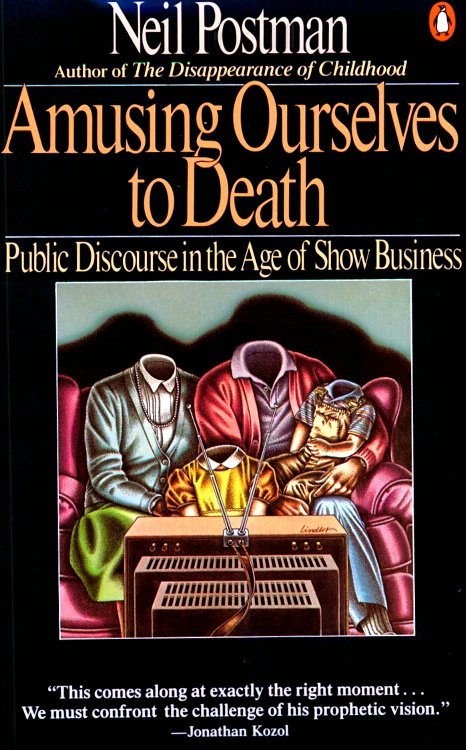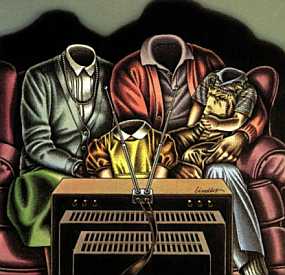Public Discourse in the Age of Show Business

Amusing_Ourselves_to_Death.zip (66.1 MB)
http://www.balderexlibris.com/index.php ... s-to-Death
[/center]
 [justify]Postman distinguishes the Orwellian vision of the future, in which totalitarian governments seize individual rights, from that offered by Aldous Huxley in Brave New World, where people medicate themselves into bliss, thereby voluntarily sacrificing their rights. Drawing an analogy with the latter scenario, Postman sees television's entertainment value as a present-day "soma", by means of which the consumers' rights are exchanged for entertainment. (Note that there is no contradiction between an intentional "Orwellian" conspiracy using "Huxleyan" means, which is an argument advanced in the later book The Unreality Industry: the deliberate manufacturing of falsehood and what it is doing to our lives by Ian Mitroff and Warren Bennis [New York: Carol Pub. Group, 1989]. Postman evidently did not disagree, since he provided a blurb for this book.)
[justify]Postman distinguishes the Orwellian vision of the future, in which totalitarian governments seize individual rights, from that offered by Aldous Huxley in Brave New World, where people medicate themselves into bliss, thereby voluntarily sacrificing their rights. Drawing an analogy with the latter scenario, Postman sees television's entertainment value as a present-day "soma", by means of which the consumers' rights are exchanged for entertainment. (Note that there is no contradiction between an intentional "Orwellian" conspiracy using "Huxleyan" means, which is an argument advanced in the later book The Unreality Industry: the deliberate manufacturing of falsehood and what it is doing to our lives by Ian Mitroff and Warren Bennis [New York: Carol Pub. Group, 1989]. Postman evidently did not disagree, since he provided a blurb for this book.)The essential premise of the book, which Postman extends to the rest of his argument(s), is that "form excludes the content," that is, a particular medium can only sustain a particular level of ideas. Thus Rational argument, integral to print typography, is militated against by the medium of television for the aforesaid reason. Owing to this shortcoming, politics and religion are diluted, and "news of the day" becomes a packaged commodity. Television de-emphasises the quality of information in favour of satisfying the far-reaching needs of entertainment, by which information is encumbered and to which it is subordinate.
Postman asserts the presentation of television news is a form of entertainment programming; arguing inclusion of theme music, the interruption of commercials, and "talking hairdos" bear witness that televised news cannot readily be taken seriously. Postman further examines the differences between written speech, which he argues reached its prime in the early to mid-nineteenth century, and the forms of televisual communication, which rely mostly on visual images to "sell" lifestyles. He argues that, owing to this change in public discourse, politics has ceased to be about a canditate's ideas and solutions, but whether he comes across favorably on television. Television, he notes, has introduced the phrase "now this", which implies a complete absence of connection between the separate topics the phrase ostensibly connects. Larry Gonick used this phrase to conclude his Cartoon Guide to (Non)Communication, instead of the traditional "the end".
Postman refers to the inability to act upon much of the so-called information from televised sources as the Information-action ratio.
 Drawing on the ideas of media scholar Marshall McLuhan ? altering McLuhan's aphorism "the medium is the message", to "the medium is the metaphor" ? he describes how oral, literate, and televisual cultures radically differ in the processing and prioritization of information; he argues that each medium is appropriate for a different kind of knowledge.
Drawing on the ideas of media scholar Marshall McLuhan ? altering McLuhan's aphorism "the medium is the message", to "the medium is the metaphor" ? he describes how oral, literate, and televisual cultures radically differ in the processing and prioritization of information; he argues that each medium is appropriate for a different kind of knowledge.The faculties requisite for rational inquiry are simply weakened by televised viewing. Accordingly, reading, a prime example cited by Postman, exacts intense intellectual involvement, at once interactive and dialectical; whereas television only requires passive involvement. Moreover, as television is programmed according to ratings, its content is determined by commercial feasibility, not critical acumen. Television in its present state, he says, does not satisfy the conditions for honest intellectual involvement and rational argument.
He also repeatedly states that the eighteenth century, being the Age of Reason, was the pinnacle for rational argument. Only in the printed word, he states, could complicated truths be rationally conveyed. Postman gives a striking example: The first fifteen U.S. presidents could probably have walked down the street without being recognized by the average citizen, yet all these men would have been quickly known by their written words. However, the reverse is true today. The names of presidents or even famous preachers, lawyers, and scientists call up visual images, typically television images, but few, if any, of their words come to mind. The few that do almost exclusively consist of carefully-chosen soundbites.[/justify]